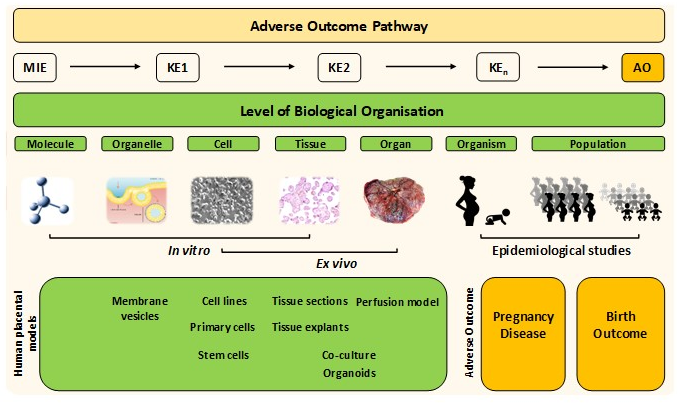
Claudia Gundacker, Assoc. Prof.in PD.in Maga. Drin.
BiologinTel.: +43 (0)1 40160-56503
E-Mail: claudia.gundacker@meduniwien.ac.at
Early life exposome
The focus of my research is on the early life exposome and associated disease risk. Dysfunction of the placenta has both direct and longer-term health effects. We combine human biomonitoring studies in mother-newborn pairs with in vitro toxicology. This allows us to study placental physiology and function in the context of prenatal exposure to xenobiotics such as the ‘forever’ chemicals PFAS. In this way, we are exploring mechanisms underlying adverse birth outcomes. Another interest is the study of placental iron metabolism in order to develop improved therapy for preterm infants with low iron levels.

Gundacker and Ellinger (2020). The unique applicability of the human placenta to the Adverse Outcome Pathway (AOP) concept: the placenta provides fundamental insights into human organ functions at multiple levels of biological organization. Reprod Toxicol, 96, 273-281.
ESFRI Exposome Austria
Exposome Austria: major research initiative looking at the impact of toxins on health
Humans are exposed to toxins and environmental factors that can significantly affect their health. The goal of exposome research is to comprehensively describe these non-genetic, external impacts, such as environmental contaminants, food ingredients, drugs and plasticisers, as well as their combined toxic effects. With this in mind, the "Exposome Austria Research Infrastructure", coordinated by the Faculty of Chemistry at the University of Vienna in partnership with the Medical Universities of Vienna and Innsbruck and the Federal Environment Agency, was launched at the start of the year.
The researchers involved at MedUni Vienna, Eva Schernhammer (Division of Epidemiology), Claudia Gundacker (Institute of Medical Genetics), and Lukas Wisgrill (Department of Pediatrics and Adolescent Medicine, Division of Neonatalogy, Intensive Care Medicine and Neuropediatrics), are contributing their expertise in environmental epidemiology and neonatal medicine, which is necessary for the planned establishment of an Austrian birth cohort including biobank.
PARC - European Partnership for the Assessment of Risks from Chemicals
2022-2027
Funding: EU Horizon Europe
Health risk of emerging concern: PFAS in the urban water cycle
2021-2024
Funding: WWTF
The project aims to investigate the sources of toxicologically relevant PFAS within the City of Vienna, their transfer via transport in the Danube and through bankfiltration into groundwater and the potentially harmful effects of waterborne PFAS exposure on zebrafish embryos and human cells. We are part of an interdisciplinary research team that will develop an innovative holistic transport and risk model. This will provide urban planners and policy makers with a tool to map future developments on the fate of PFAS in the environment and the risk they pose to human health.
Iron metabolism of the human placenta – the key to understand iron transfer from the mother to the fetus
2017-2022
Funding: GFF
Iron is essential for healthy fetal development. However, iron metabolism in the human placenta is poorly understood. This project aims to fill key gaps in our knowledge of the transfer of iron from mother to fetus across the placenta. This will be accomplished by combining: 1) a clinical study of mother-infant pairs to determine maternal and neonatal iron status in relation to placental iron metabolism, 2) an in-vitro part that will clarify the functional role of candidate proteins in placental cell models, and 3) in-situ localization of these proteins in term placentas.
Sebastian Granitzer
PostDoc
Raimund Widhalm
PostDoc
Simon Atteneder
Diploma student
Emir Hadziavdic
Technical Assistant
Former PhD Students:
Martin Forsthuber, Raimund Widhalm, Andreas M Kaiser, Sebastian Granitzer, Elisabeth Straka
Former Undergraduate Students:
Master/Bachelor students: Benjamin Natha, Teresa Mayerl, Robert Bajtela, Rumsha Khan, Rosie Cabuk, Veronika Plichta, Jasmin Schatz, Christina Balthasar, Lukas Damjanovic, Theresa Kaudela, Tamara Szattler, Sonja Bleichert, Elisabeth Lahner, Iris Bachtrog, Judit Repas, Judith Pickem
Diploma students: Eva Steinacher, Isabella Teufl, Theresa Reischer, Jost Kemper, Martin Reiter, Bettina Alber, Rene Shammas, Susanne Prinz, Lizzy Weber, Marija Simic
Selected Publications
Krausová, M., Braun, D., Buerki-Thurnherr, T., Gundacker, C., Schernhammer, E., Wisgrill, L., & Warth, B. (2023). Understanding the Chemical Exposome During Fetal Development and Early Childhood: A Review. Annual Review of Pharmacology and Toxicology, 63(1), 24.21-24.24.
Gundacker, C., Graf-Rohrmeister, K., Gencik, M., Hengstschläger, M., Holoman, K., Rosa, P., Kroismayr, R., Offenthaler, I., Plichta, V., Reischer, T., Teufl, I., Raffesberg, W., Scharf, S., Köhler-Vallant, B., Delissen, Z., Weiß, S., & Uhl, M. (2021). Gene Variants Determine Placental Transfer of Perfluoroalkyl Substances (PFAS), Mercury (Hg) and Lead (Pb), and Birth Outcome: Findings From the UmMuKi Bratislava-Vienna Study. Front Genet, 12, 664946.
Forsthuber, M., Kaiser, A. M., Granitzer, S., Hassl, I., Hengstschläger, M., Stangl, H., & Gundacker, C. (2020). Albumin is the major carrier protein for PFOS, PFOA, PFHxS, PFNA and PFDA in human plasma. Environ Int, 137, 105324.
Widhalm, R., Ellinger, I., Granitzer, S., Forsthuber, M., Bajtela, R., Gelles, K., Hartig, P. Y., Hengstschläger, M., Zeisler, H., Salzer, H., & Gundacker, C. (2020). Human placental cell line HTR-8/SVneo accumulates cadmium by divalent metal transporters DMT1 and ZIP14. Metallomics, 12(11), 1822-1833.
Gundacker, C., & Ellinger, I. (2020). The unique applicability of the human placenta to the Adverse Outcome Pathway (AOP) concept: the placenta provides fundamental insights into human organ functions at multiple levels of biological organization. Reprod Toxicol, 96, 273-281.
